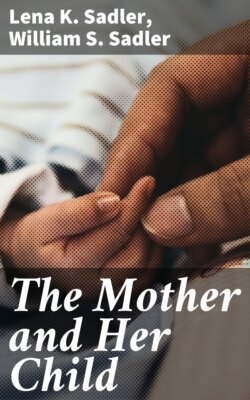Читать книгу The Mother and Her Child - Lena K. Sadler - Страница 39
На сайте Литреса книга снята с продажи.
DIET
ОглавлениеThere are certain laws which govern the diet at all times; for instance, the man who digs ditches requires more of a certain element of food and more food in general, than does the man who digs thoughts out of his brain. The growing child requires somewhat different elements of food than does an adult. In other words, "The diet should suit the times, occasions, occupations, etc."
In the case of the expectant mother it should be remembered that the child gains nine-tenths of its weight after the fifth month of pregnancy, and it is, therefore, not necessary that a woman shall begin "eating for two" until after the fifth month. And since it is also true that the baby doubles its weight during the last eight weeks of pregnancy, it follows that then is the time when special attention must be given to the quantity as well as the quality of "mothers' food."
During the first five months, if the urine and blood-pressure are normal, the "lady in waiting" should follow her usual dietetic tastes and fancies so long as they do not distress or cause indigestion. Because of the additional work of the elimination of the fetal wastes, much water, seven or eight glasses a day, should be taken; while one of the meals—should there be three—may well consist largely of fruit. All of the vegetables may be enjoyed; salads with simple dressings and fruits may be eaten liberally. Of the breads, bran, whole wheat, or graham are far better for the bowels than the finer grain breads, or the hot breads.
Something fresh—raw—should be taken every day, such as lettuce, radishes, cabbage salad, and fresh fruits.
If the prospective mother is accustomed to the liberal use of meat, providing the blood-pressure and urine are normal, she may be able to indulge in meat once a day. Many physicians believe that the maternal woman should eat meat rather sparingly—from once a day to once or twice or three times a week.
Of the desserts, gelatine, junket, ice cream, sponge cake, and fruit are far better than the rich pastries, which never fail even in health to encourage indigestion and heart burn. The fruitades are all good. Candies and other sweets may be eaten in moderation. Alcohol should be avoided. Tea and coffee should be restricted, and in many cases abandoned. For many, two meals and a lunch of fruit or broth are better than three full meals. There is a continual and increased accumulation of waste matter which must be thrown off by the lungs, kidneys bowels, and skin; so that clogging of one channel of elimination makes more work for one or more of the other eliminative organs.
Sometimes the craving for food is excessive, and the desire to nibble between meals is quite troublesome. These unusual feelings should be controlled or ignored. A glass of orangeade will sometimes satisfy this unnatural craving. Save your appetite for meal time—for a good appetite means good digestion—all things equal. The woman who habitually eats between meals is the sluggish, constipated individual who needs to acquire self-control and learn self-mastery.
